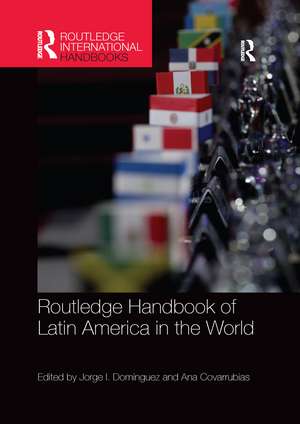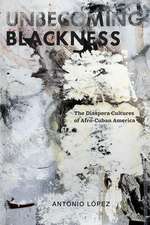Routledge Handbook of Latin America in the World
Editat de Jorge Dominguez, Ana Covarrubiasen Limba Engleză Paperback – 12 iul 2022
The Routledge Handbook of Latin America in the World is a must-have reference for academics, researchers, and students in the fields of Latin American politics, international relations, and area specialists of all regions of the world.
| Toate formatele și edițiile | Preț | Express |
|---|---|---|
| Paperback (1) | 431.24 lei 6-8 săpt. | |
| Taylor & Francis – 12 iul 2022 | 431.24 lei 6-8 săpt. | |
| Hardback (1) | 1455.21 lei 3-5 săpt. | +42.21 lei 6-12 zile |
| Taylor & Francis – 10 noi 2014 | 1455.21 lei 3-5 săpt. | +42.21 lei 6-12 zile |
Preț: 431.24 lei
Nou
Puncte Express: 647
Preț estimativ în valută:
82.52€ • 86.33$ • 68.55£
82.52€ • 86.33$ • 68.55£
Carte tipărită la comandă
Livrare economică 03-17 aprilie
Preluare comenzi: 021 569.72.76
Specificații
ISBN-13: 9781032340227
ISBN-10: 1032340223
Pagini: 496
Dimensiuni: 174 x 246 mm
Greutate: 0.81 kg
Ediția:1
Editura: Taylor & Francis
Colecția Routledge
Locul publicării:Oxford, United Kingdom
ISBN-10: 1032340223
Pagini: 496
Dimensiuni: 174 x 246 mm
Greutate: 0.81 kg
Ediția:1
Editura: Taylor & Francis
Colecția Routledge
Locul publicării:Oxford, United Kingdom
Cuprins
Introduction: Latin America in World Politics (Ana Covarrubias and Jorge I. Domínguez) Part I: Latin America in the World 1. A Transformed Latin America in a Rapidly Changing World (Abraham F. Lowenthal and Hannah M. Baron) Part II: Theoretical Approaches 2. Realism in the Periphery (Carlos Escudé) 3. Grand Strategy (Roberto Russell and Juan Gabriel Tokatlian) 4. Autonomy and Latin American International Relations Thinking (Arlene B. Tickner) 5. The Dynamics of Asymmetrical Development: Latin America in the Global Economy (Nicola Phillips) 6. Liberalism, Constructivism, and Latin American Politics since the 1990s (Arturo Santa-Cruz) 7. Presidentialist Decision Making in Latin American Foreign Policy: Examples from Regional Integration Decisions (Andrés Malamud) Part III: Latin American Foreign Policies 8. Argentina’s Foreign Policy (Roberto Russell and Juan Gabriel Tokatlian) 9. Re-thinking Global and Domestic Challenges in Brazilian Foreign Policy (Monica Hirst and Maria Regina Soares de Lima) 10. Venezuela’s Foreign Policy, 1920s-2010s (Javier Corrales and Carlos A. Romero, Translation by Michael Ordower) 11. Decision Making in Mexican Foreign Policy (Rafael Fernández de Castro) 12. Cuba’s External Projection: The Interplay between International Relations Theory and Foreign Policy Analysis (Carlos Alzugaray) Part IV: Extra-regional Actors 13. The United States and Latin America (Mark Eric Williams) 14. Shaping Chinese Engagement in Latin America (Margaret Myers) 15. Latin America’s Relations with Europe: A Stable but Limited and Fragmented Partnership (Susanne Gratius) 16. Japan’s Relations with Latin America and the Caribbean: Broad Changes under Globalization (Kanako Yamaoka) Part V: Integration and Multilateralism 17. Trade and Economic Integration (Antoni Estevadeordal, Paolo Giordano, and Barbara Ramos) 18. North America (Robert A. Pastor) 19. Turning Inward: Ruling Coalitions and Mercosur’s Retrenchment (Joshua Malnight and Etel Solingen) 20. Regional Multilateralism in Latin America: UNASUR, ALBA, and CELAC (Natalia Saltalamacchia Ziccardi) 21. Beyond Reach? The Organization of American States and Effective Multilateralism ( Thomas Legler) 22. The Inter-American Court of Human Rights: Its Decisive Impact on Latin American Rights (Diego García-Sayán) Part VI: Issues in Latin America’s International Relations 23. Latin America and the Idea of International Human Rights (Kathryn Sikkink) 24. The Dynamics of Nuclear Politics: Lessons from Latin America (Jacques E. C. Hymans) 25. The International Politics of Drugs and Illicit Trade in the Americas (Peter Andreas and Angelica Duran Martinez) 26. Latin America in Global Environmental Governance (Kathryn Hochstetler) 27. Migration in the Americas (Alexandra Délano) 28. Inter-state Security Issues in Latin America (David R. Mares) 29. Business beyond Boundaries in Latin America: The Power of Multilatinas and Innovative Practices to Address Growth and Social Advancement (Gustavo Herrero)
Notă biografică
Jorge I. Domínguez is Antonio Madero Professor for the Study of Mexico, vice provost for international affairs, special advisor for international studies to the dean of the faculty of arts and sciences, and chairman of the Harvard Academy for International and Area Studies at Harvard University. A past president of the Latin American Studies Association and a past board chairman of the Latin American Scholarship Program of American Universities, he currently serves on the editorial boards of Political Science Quarterly, Foreign Affairs Latinoamérica, Cuban Studies, Foro internacional, and Journal of Cold War Studies.
Ana Covarrubias is a faculty member of the Centre for International Studies of El Colegio de México. She obtained her BA in International Relations from El Colegio de México, and an MPhil/DPhil from the University of Oxford. She teaches Latin American international relations, theory of international relations, US and Canadian foreign policy, and Mexican foreign policy. Her research focuses on Mexican foreign policy, especially Mexican-Cuban relations, and she has worked on human rights and foreign policy.
Ana Covarrubias is a faculty member of the Centre for International Studies of El Colegio de México. She obtained her BA in International Relations from El Colegio de México, and an MPhil/DPhil from the University of Oxford. She teaches Latin American international relations, theory of international relations, US and Canadian foreign policy, and Mexican foreign policy. Her research focuses on Mexican foreign policy, especially Mexican-Cuban relations, and she has worked on human rights and foreign policy.
Recenzii
"As Latin America’s polities, economies, and societies transformed over the last thirty years, so too did their standing worldwide. Despite the dynamic changes, Latin American international relations have remained understudied. In this latest Handbook, Domínguez and Covarrubias work to fill this gap, bringing together some of the best academic thinkers on this vast subject, and providing new insights as to how many of these nations engage globally and the role they can play in an evolving world." —Shannon O’Neil, Senior Fellow for Latin America Studies, Council on Foreign Relations; Author of Two Nations Indivisible: Mexico, the United States, and the Road Ahead.
"Domínguez and Covarrubias have assembled a topflight and admirably diverse group of scholars and analysts to illuminate the profound, often stunning, transformations in Latin America’s global affairs in recent years. The chapters are conceptually sophisticated, historically informed, and empirically rich. Their keen insights and cogent arguments challenge conventional assumptions about the region’s international relations. The original, nuanced interpretations contained in this volume are an indispensable guide to the complex forces shaping Latin America’s past and future trajectories on the world stage."—Michael Shifter, President, Inter-American Dialogue
"The impressive authors come from throughout the Americas as well as Europe and Asia. The book is significant not just for Latin American studies but also for international relations theory, international political economy, regional integration studies, US foreign policy, and the study of human rights. Summing Up: Highly recommended."--A. Siaroff, The University of Lethbridge, CHOICE
"Domínguez and Covarrubias have assembled a topflight and admirably diverse group of scholars and analysts to illuminate the profound, often stunning, transformations in Latin America’s global affairs in recent years. The chapters are conceptually sophisticated, historically informed, and empirically rich. Their keen insights and cogent arguments challenge conventional assumptions about the region’s international relations. The original, nuanced interpretations contained in this volume are an indispensable guide to the complex forces shaping Latin America’s past and future trajectories on the world stage."—Michael Shifter, President, Inter-American Dialogue
"The impressive authors come from throughout the Americas as well as Europe and Asia. The book is significant not just for Latin American studies but also for international relations theory, international political economy, regional integration studies, US foreign policy, and the study of human rights. Summing Up: Highly recommended."--A. Siaroff, The University of Lethbridge, CHOICE
Descriere
The Routledge Handbook of Latin America in the World provides a comprehensive analysis of Latin America's global engagement, making it a must-have reference for academics, researchers, and students in the fields of Latin American politics, international relations, and area specialists of all regions of the world.











